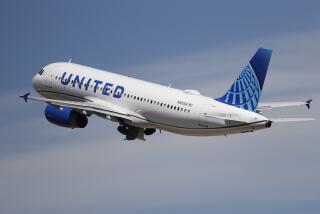Flight Attendants Cruise Beyond the Bad Old Days of ‘Coffee, Tea or Me?’
- Share via
I guess I’ve flown on airplanes hundreds of times by now. But a few weeks ago on a TWA flight, I noticed something I’d come to take for granted: the flight attendants. Most were middle-age women, hard-working and polite, but not servile. A far cry from the pretty young things who tended to passengers’ every need in the bad old days of “Coffee, Tea or Me?” (a book written in 1969 by two stewardesses). Back then, the exclusively female cabin crew members had to weigh in and wear girdles, and advertising slogans traded on their sexual allure (such as Continental’s “We really move our tails for you”).
The Civil Rights Act of 1964 changed all that, prohibiting the airlines from forcing stewardesses to retire when they got married, pregnant or older than 35, and ultimately opening the profession to men. According to the Assn. of Professional Flight Attendants (APFA), about 15% of the 43,000 flight attendants that the organization represents are male, generally with the upper-body strength to help passengers hoist heavy carry-on baggage into overhead bins.
For the record:
12:00 a.m. Dec. 27, 1998 For the Record
Los Angeles Times Sunday December 27, 1998 Home Edition Travel Part L Page 4 Travel Desk 1 inches; 34 words Type of Material: Correction
Her World--Due to a reporting error, the Assn. of Flight Attendants (AFA) was incorrectly identified as the Assn. of Professional Flight Attendants (APFA) in “Flight Attendants Cruise Beyond the Bad Old Days of ‘Coffee, Tea or Me?’ ” (Dec. 13).
Of course, we don’t call them stewardesses anymore. And while they still serve meals and fetch blankets, their primary responsibility is passenger safety (as it was when the first flight attendants, all registered nurses, were hired in 1930). Not only do they take charge in crises, but they set the tone on ordinary flights, allaying passengers’ generalized fears about flying.
Diana Fairechild, a flight attendant with Pan Am and United for 21 years and author of the book “Jet Smart” (Celestial Arts, $12.95), learned how sensitive their work can be on a flight some years ago that had taken off without silverware. When she got up and said she had an announcement to make, the passengers gasped in unison.
In some foreign countries, flight attendants still quietly suffer harassment and discriminatory employment practices (All Nippon Airways and EVA Air hire only women for the job), as well as strict comportment and appearance rules. In the U.S., appearance and weight requirements have yielded, though flight attendants must be able to squeeze into tight spots, lift heavy loads and reach over passengers to serve drinks.
For instance, Southwest Airlines--which, according to former Southwest flight attendant Sharon Carpenter, once had quarterly weigh-ins--now seeks candidates for the position who are “height and weight proportioned.” And Fairechild sees the airlines’ insistence on good grooming as a reasonable way to boost passenger confidence, because, she says, “If you look disheveled, people feel nervous.”
Maybe most significant of all is the fact that flight attendants remain in the profession for longer than they used to. Sharon Wingler, author of “Travel Alone & Love It: A Flight Attendant’s Guide to Solo Travel” (Chicago Spectrum Press, $14.95), thought she’d work for the airlines for a year or two when the travel bug bit and she became a stewardess. That was in November 1969, and she’s still flying. More than half the APFA’s membership has been in the profession for at least 10 years, and many flight attendants who were forced to retire due to advancing age, marriage or pregnancy returned to the job after the laws changed. The reason? Seniority--which is what makes it all worthwhile.
Salaries are based on seniority, as is who gets the most attractive assignments, with nonstop flights to interesting places deemed best. Every month flight attendants bid on the routings they want, which is how 29-year-veteran Wingler this month landed a prized two-days-on, five-days-off schedule, flying from Chicago to San Diego with one stop in Atlanta and a 20-hour layover in a nice San Diego hotel--giving her plenty of spare time to write and to travel for fun.
Lois Stine, who’s flown with American for 31 years (stationed in the galley, where she serves as chef for first and business classes), spends most months working nonstop Chicago-to-Europe flights, with a three-days-on, four-days-off schedule. Her routine is complicated by the fact that she has to fly from her home in San Diego early every Wednesday morning to catch her Europe-bound flight in Chicago, making for a long day in the air. But the price of the commuter flight is just the $11.25 tax on the ticket since, as an airline employee, Stine flies free.
Short flights with lots of legs are much more grueling, as Carpenter found during her days at Southwest. And just imagine what it was like for Fairechild when she spent eight days out of every month flying around the world: Day 1, L.A. to London; Day 2, on to Beirut; Day 3, New Delhi; Day 4, Bangkok; Day 5, Hong Kong; Day 6, Tokyo; Day 7, Honolulu; Day 8, home to L.A. Clearly, being a flight attendant is long, hard, jet-lagged, life-disruptive work. Relationships and parenting can suffer, and many who took the job because they love to travel find that boarding a plane is the last thing they want to do when they go off the clock.
Then, too, as Stine says, “passengers have changed. Flying used to be a wonderful and exciting novelty. Now they consider it the worst thing about a vacation. They’re not going to see you again, so they think they can be as rude as they like.”
Today, incivility rather than sexism is what most flight attendants complain about--sometimes escalating into cases of “air rage,” with passengers attacking members of cabin crews. Lord knows, with planes perpetually crowded and carry-on restrictions tightening up, we’ve all gotten testy with flight attendants. But from now on, I’m going to be nice, if only for selfish reasons, like getting an extra cup of tea. Funny how it works, but when you’re nice to them, they’re usually nice to you.
More to Read
Sign up for The Wild
We’ll help you find the best places to hike, bike and run, as well as the perfect silent spots for meditation and yoga.
You may occasionally receive promotional content from the Los Angeles Times.






